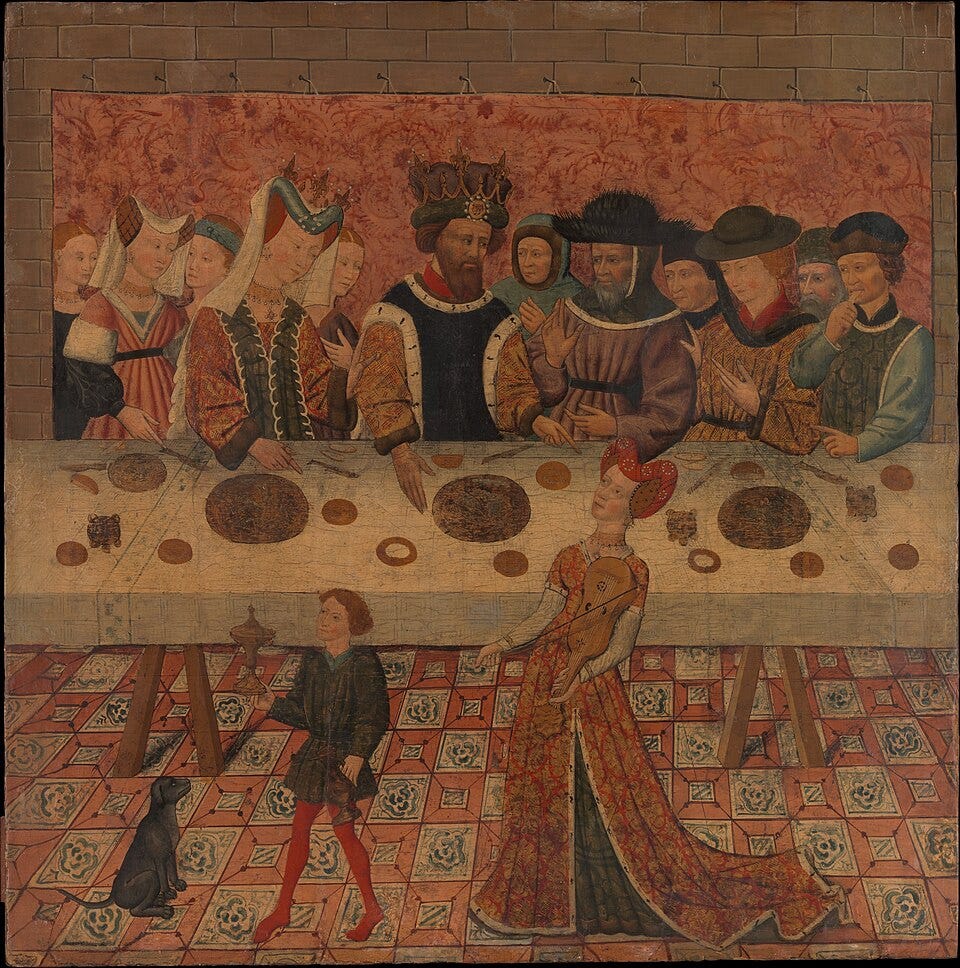I am, I am pretty sure, officially on vacation, so this space is going to become all lackadaisical and full of sunshine. And by that I mean that we will be stripping wallpaper and painting and moving furniture and trying not to die of the heat. What was that program where people change houses and decorate them? Changing Spaces? No, that’s not what I mean. We’re only moving rooms. Three girls are moving into the attic because I’m too tired to climb up there at night. The oldest offspring is moving into the room on the end. The sole remaining male child is moving into the oldest child’s room. And I am appropriating his room as an office. And this is because I deserve a room of my own.
Anyway, the wallpaper is not coming off at a very fast pace, even though one whole person has only been doing that full time for a week already. Soon we will all have put our backs to the stone, or whatever metaphor that is.
So, first of all, here is the wonderful reel I mentioned last night in the livestream. It’s of Stanzi Potenza being an Elf explaining how all the elves are “going to be out of town, like, forever” and therefore can’t go to war against the Dark Lord and Mordor. Give it a watch, seriously, I implore you:
 Tiktok failed to load.
Tiktok failed to load.Enable 3rd party cookies or use another browser
I’ve been walking around saying to all and sundry, “I feel so mad for you,” and “you can overcome, no really, you can,” and “have some Lembas bread.”
Not only is that reel funny, not only is it brilliantly quotable, best of all, it gets to something crushingly uncomfortable about being human: I, as an individual, cannot bear the weight of the responsibility of being who I am.
I know I’m always blathering on about Edwin Friedman, but this is his essential point, though it is so intolerable to grapple with. To be a self who is able to relate to other selves means two things. First, it means taking responsibility only for those parts of life that pertain to me being a self. Second, it means taking responsibility at all when the inclination is to foist that desperate experience onto other people. It’s so simple a thought, and yet impossible to do.
Today is the feast of John the Baptist, and so if you pray the Daily Office, you would have read this:
But when Herod's birthday came, the daughter of Herodias danced before the company and pleased Herod, so that he promised with an oath to give her whatever she might ask. Prompted by her mother, she said, “Give me the head of John the Baptist here on a platter.” And the king was sorry, but because of his oaths and his guests he commanded it to be given. He sent and had John beheaded in the prison, and his head was brought on a platter and given to the girl, and she brought it to her mother. And his disciples came and took the body and buried it, and they went and told Jesus.
So many things are going on here, but one of them is that Herod, like Adam before him, wanted the delights of this life without enduring any consequences or shouldering any responsibility. It’s ironic, really, that John loses his head in this P. Diddy-esque debauchery, because the head is the metaphor upon which the spiritual reality turns.
The head, the crown as it were, bears responsibility. If you willingly enjoin yourself to a congregation, for example, the pastor is held responsible for the state of your soul and body, to deliver you up safe into eternity. If you are a parent, you are the head over your child. If you are a Christian, your Head is Christ. He bears the weight of your soul and body and mind and heart. And I quite like the word “bear” in this case, because even though the Head sits atop the whole, held aloft by the neck as it were, it is nevertheless crushed under the spiritual and emotional weight of mortal existence.
When God made Adam and put him in the garden, he was meant to stand upright, to walk around, to work and be happy, but he was never meant to bear the full weight of his own soul. He was always meant to put that weight on God, to walk with him and talk with him in the cool of the day, to rely so fully on his Maker that his feet barely touched the ground. He wasn’t made to wake up in the middle of the night and try to figure out whether there is or is not a cease fire between Israel and Iran and where the President of the United States figures in. He was made to sleep in perfect peace, his mind stayed on the Holy One enthroned upon the praises of his people.
Adam made a miserable calculation and decided he could handle himself without the assistance of God. He would bear the responsibility of his existence, independently from the One who made him. And the moment he made that decision, he descended into the purgatorial Sheol of blame and responsibility shifting. It was Eve’s fault. It was the Serpent’s fault. But really it is God’s fault for making any of us.
From thenceforth, we as humans can only pull ourselves together and accept responsibility about 70% of the time, though often much less. The goal is to at least not be Herod who, because of his sickening oath, the wine, his guests, and his pride, did away with the Lord’s prophet. Herod is the platonic ideal of someone who tries to look reality in the face (he liked to go and listen to John preach in prison) and always flinches. At the end of the day, it is everyone else’s fault. It is John’s fault for not keeping quiet. It’s Salome’s fault for making such a request. It’s Herodias’ fault for having such a daughter. It’s God’s fault for making the world this way.
In the more intimate spheres of life that don’t have to do with all the nations of the world and the governors and demons who may or may not be ruling them, to be human is to try to foist the weight of your soul onto the people you know best because it’s so uncomfortable to bear yourself. We get tangled up, raveling and unraveling the substance of who we are into the souls and minds and hearts of others. We want other people to make the pain of being a sinner toiling through life go away. We want our mothers and fathers to have done a better job. We want our children not to disappoint us. We want our friends to erase the depth of our suffering. We want the mayor and the governor and the president to be good people.
One thing we don’t want to do is the thing that Adam didn’t want to do either. We don’t want to bear our immiserated souls to God, for that is the worst pain of all. To open yourself up to the light of the Almighty and let him pass a true judgment about what kind of person I am and whether or not I am really to blame—that is impossible.
Of course, with God, all things are possible, but almost nothing is comfortable. All the ways I try to make other people responsible for me are about grasping existential comfort. I don’t want God to look at me because I can’t bear it. I prefer for you to make me feel better even though I will continue to be fairly dysfunctional through the whole course of my life. In this way, Herod, a few years after the death of John, when presented with the Lord of Heaven and Earth, found he preferred to become good friends with Pilate—to hell with Jesus, who would be nailed to the Tree as the curse and the blame we all deserve.
Where do the Elves and their refusal to go to war against the Dark Lord fit in? Because, in what feels like a cruel irony, it doesn’t help other people to take responsibility for them. You can stand by, feeling the weight of grief and sin alongside others, but you can’t bear it for them. You can’t turn the face the Savior of the world who is the only one who has the power to make them whole. You can’t fix it. And when you try, you often make it worse, or at least delay the inevitable confrontation between them and God.
Your best and surest comfort, along the way, is the Lembas bread, the bread of heaven, which is, miraculously, enough to sustain you, if only you will put your hands out, and take it, and eat it. And now, if you will excuse me, I’m going to try to block out the news, about which I can do nothing except pray, and peel wallpaper. Have a nice day!





Also. I just realized at this very moment that Samuel’s Here I Am is a direct contrast to Adam’s hiding from God. It underscores that relational notion to God that Martin Buber keeps on about in his work I and Thou.
Chef’s kiss on today’s writing! Especially loved this sentence:
He would bear the responsibility of his existence, independently from the One who made him.